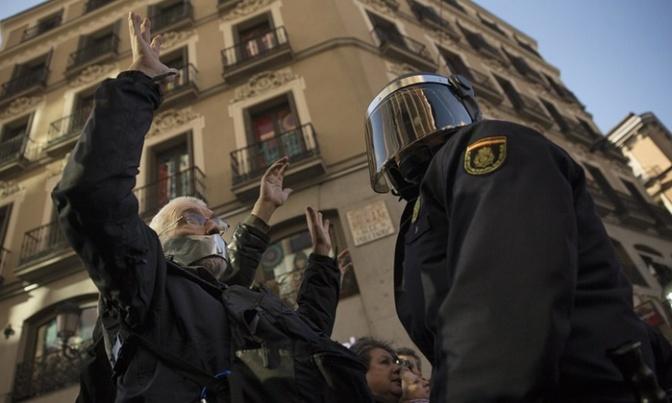Freedom
Definition: Freedom starts with a principle of self-control. In a free society, each and every person has legal control of their own body and mind. It refers specifically to equal empowerment. In other words, a free society is one with an equal distribution of legal rights and in which each and every person has as much legal rights as possible.
We agree with this definition of freedom because the more limitations you have the less free you are. But we also think that freedom obviously cannot include the legal right to limit other people’s freedom because that would be illogical.
The fear of freedom means that more choices doesn’t mean more freedom. So, when we get out of our “fishbowl” we think that we are going to feel better because we are going to choose our own decisions. Instead, it isn’t like that, because when we get out, we feel fear of everything because if we choose the wrong choice it will be our fault and we get shocked.
Freedom is the possibility of doing whatever you want, whenever you want and do it in the way you want if and when it’s inside your principles. As Barry Schwartz said, everyone needs a fishbowl, but in my opinion that fishbowl is our principles, so all of us have got different fishbowls, and when we break the fishbowl and we have to go to another one, it’s obvious we are going to be afraid of what to do.
Also, having a lot of choices doesn’t make us free. The thing that makes us free is to know what to choose.
There are different points of view about freedom; for example, Luis Antonio de Villena said “It’s amazing seeing how when the theoretical freedom goes up, the practical freedom goes down”. There are more famous quotations; Bill O’ Brian said “People think they are freedom when they don’t care about external thoughts, but they don’t know that they are overwhelmed of a wore fact; they only have one thought”. Other famous quotation is “Free people let other persons to be free” but the person who said that was unknown.
Saudi Arabia
The freedom of women in Saudi Arabia is null. Here we have seven things that women cannot do in this country:
Leave home alone
Saudi women must leave home accompanied always by a man of the family, whether for shopping or to visit the doctor.
Drive
Officially women do not have prohibited drive, but in practice they cannot do it because not allowed by the highest religious authority.
Bring clothes or makeup that shows its beauty
The majority of women in Saudi Arabia wear abaya, a garment that hides them the body completely. In the country there is also the religious police, which controls the feminine garment and tends to be very strict, and they can be fined a woman for simply show a toe.
Compete in certain sports
Saudi sportswomen participated for the first time at an Olympic Games in 2012 in London, where two women from the Arab country competed in the tests of judo and athletics. It was a historical fact that has not repeated since then. However, Riad has pledged to send to any athlete to the games in Rio de Janeiro.
Interact with men
In Saudi Arabia, virtually all public spaces are segregated by sex. The majority of public buildings has an entry for men and another for women.
Test the clothes shopping
Women should buy clothes and try it at home. Only the abaya in some luxury shops testers can be removed.
Use a hotel gym
Virtually none of the hotels in the country allows the entry of women in the gym.
A part from the women issue, when journalists do not make as they told the Government of Saudi Arabia, they are sentenced to lashes and is allowed to crucify people.
Article
Spain puts 'gag' on freedom of expression as senate passes security law
Despite a global outcry, Spanish legislation, expected to be ratified next month, lays out strict guidelines on demonstrations that come with steep fines
The Spanish senate has voted to push forward with controversial changes to the country’s public security laws, cracking down on Spaniards’ rights of freedom of assembly and expression despite opposition from activists and human rights groups. 
Recent years have seen millions of Spaniards take to the streets to voice their dissatisfaction with the rightwing People’s party government, protesting against crippling austerity measures and attempts to roll back the country’s abortion laws. Now the government has hit back with legislation, dubbed the “gag law” by critics, that seeks to limit protests by laying out strict guidelines on when and where they can take place and penalizing offenders with steep fines.
The legislation includes fines of up to 600 euros for failing to notify authorities about demonstrations in public areas, even in the case of peaceful protests. Once approved, marches that veer from the approved itineraries could face fines of up to 600 euros.
The fines climb to 30,000 euros for protests that result in “serious disturbances of public safety” near parliament and Spain’s regional government buildings. Unauthorized protests that take place near key infrastructure, such as transportation hubs, nuclear power plants, refineries and telecommunications installations could result in fines of up to 600,000 euros.
Personal opinion
I think that having freedom for what you want to do is something that everybody should have, above all if what you want is to protest peacefully, because everyone has the right to be heard and the freedom of expression.
Removing these rights means that society in this country is being controlled by the government, and it’s a signal of corruption. This violates The Human Rights, and creates something like a dictatorship.
No comments:
Post a Comment